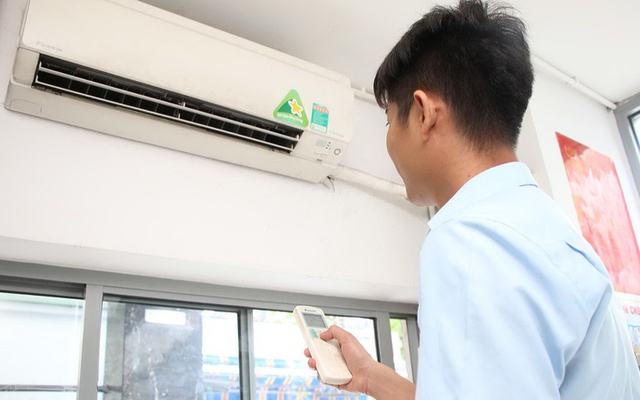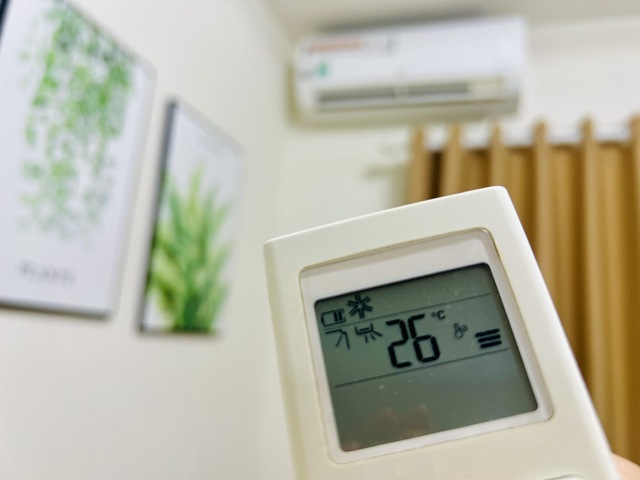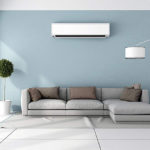During the heat season, the demand for air conditioner use increases. It is important to know how to use the air conditioner effectively in order to avoid heat shock, health issues, and excessive electricity consumption. Below are some common mistakes to avoid when using air conditioners, as shared by a home appliance store owner.
Directing Air Conditioner Airflow Directly at the Body
During the hot season, it is common for individuals to enter a room and immediately lower the temperature while aiming the cool air directly at their bodies for quick relief. However, this practice is a significant error as the outside temperature can reach approximately 40°C. Directing a 12 – 15°C air flow towards the body in such extreme conditions can result in heat shock, adversely affecting breathing. It is important to avoid this misconception and adopt proper cooling methods to maintain comfort.

Please refrain from directing the airflow of the air conditioner directly towards the body.
To effectively cool down, simply set your fan to its highest speed and adjust the blades to direct airflow upwards towards the ceiling. This enables quick distribution of cold air throughout the entire room.
According to the principle that hot air is lighter than cold air, adjusting the airflow toward the top of the room promotes the effective distribution of cold air, ensuring uniform circulation and delivering a comfortable environment throughout the entire space.
Neglecting to Clean Air Conditioner Could Cause Health Problems
Regularly cleaning your air conditioner is essential for maintaining its efficiency and preventing the accumulation of dust and dirt. Failure to do so can lead to a clogged drainage pipe. To ensure optimal performance, it is recommended to clean your air conditioner every 3 – 4 months.
Consumers Should Be Cautious When Buying Air Conditioner Capacity
There is a common misconception that air conditioners with larger capacities will provide cooler temperatures, while those with smaller capacities will be more energy efficient. However, it is important to consider the size of the room when choosing an air conditioner, as installing a unit with too high a capacity in a small room can have negative effects on health. Conversely, installing a unit with too low a capacity in a large room will result in continuous operation and higher power consumption.
When purchasing an air conditioner, it is recommended by electrical appliance stores to consider the size of your room. Consult the store staff for their expert recommendation on the appropriate capacity for your specific space. For rooms measuring less than 15 m2, a 1HP air conditioner is advised. Rooms ranging from 15 to 20 m2 should be equipped with a 1.5HP air conditioner. For rooms measuring 20 to 30 m2, a 2HP air conditioner is recommended. Lastly, for spaces ranging from 30 to 40 m2, a 2.5HP air conditioner is suggested.

Please avoid placing the air conditioner near any source of heat.
When selecting an air conditioner, it is important to consider various factors such as the size of the room, the ceiling height, the direction of windows, and the number of people residing in the room. These factors can help determine the appropriate capacity of the air conditioner, typically ranging from 0.5HP to 1HP. By considering these factors, you can ensure optimal cooling and energy efficiency in your living space.
Positioning an Air Conditioner Close to a Heat Source
The Importance of Proper Air Conditioner Installation
When it comes to installing an air conditioner, it is crucial to consider its placement carefully. If the unit is installed near a heat source or in a corner with obstacles in front of it, it can significantly reduce the amount of air emitted. This can lead to uneven room temperature and an ineffective cooling system.
Furthermore, installing the air conditioner near a heat source can cause the unit to work continuously, leading to overload and ultimately reducing its lifespan. It is important to ensure that the unit is placed in a suitable location that promotes efficient cooling and optimal air distribution.
Experts recommend positioning the air conditioner in a secluded corner of the room, away from sunlight and any heat-emitting appliances such as the kitchen or refrigerator.
Eliminating Unpleasant Air Conditioner Odors: 3 Simple Steps
Is the noxious odor from your new air conditioner impacting your indoor experience? Don’t worry – we can help! There are numerous easy ways to tackle this issue and get your air conditioner smelling great again. Learn about these simple solutions that will help restore your environment and ensure a pleasant air quality!
“Strategies for Lowering Electricity Usage When Using Air Conditioners and Air Coolers in Hot Weather”
With the hot summer months on the horizon, many of us are anticipating the need to use our air conditioners more frequently. However, with the extra use comes a higher electricity bill. XANH Electronics has the perfect solution – 10 helpful tips that will ensure you are using your AC more efficiently, and keeping costs down in the process!






































